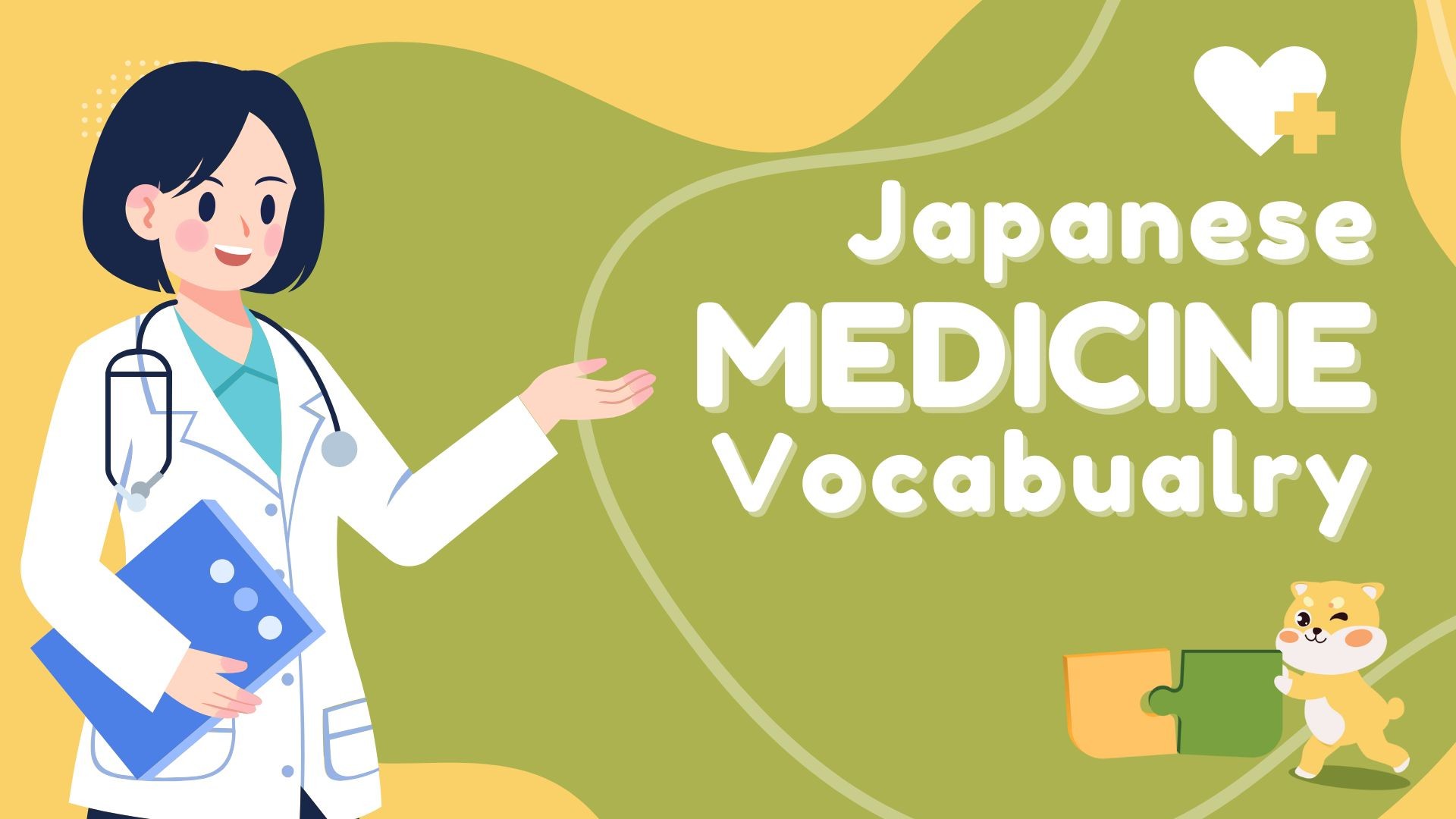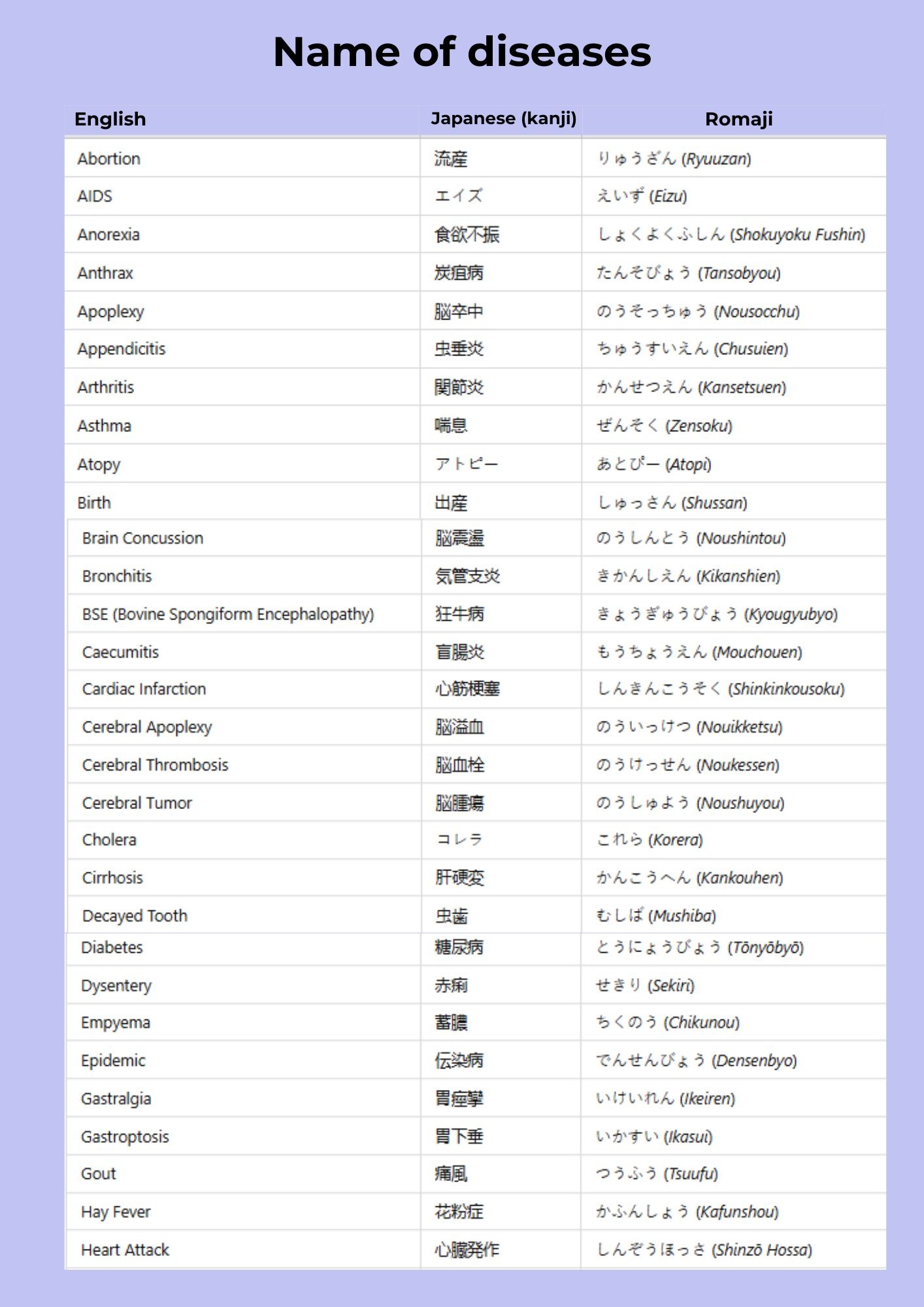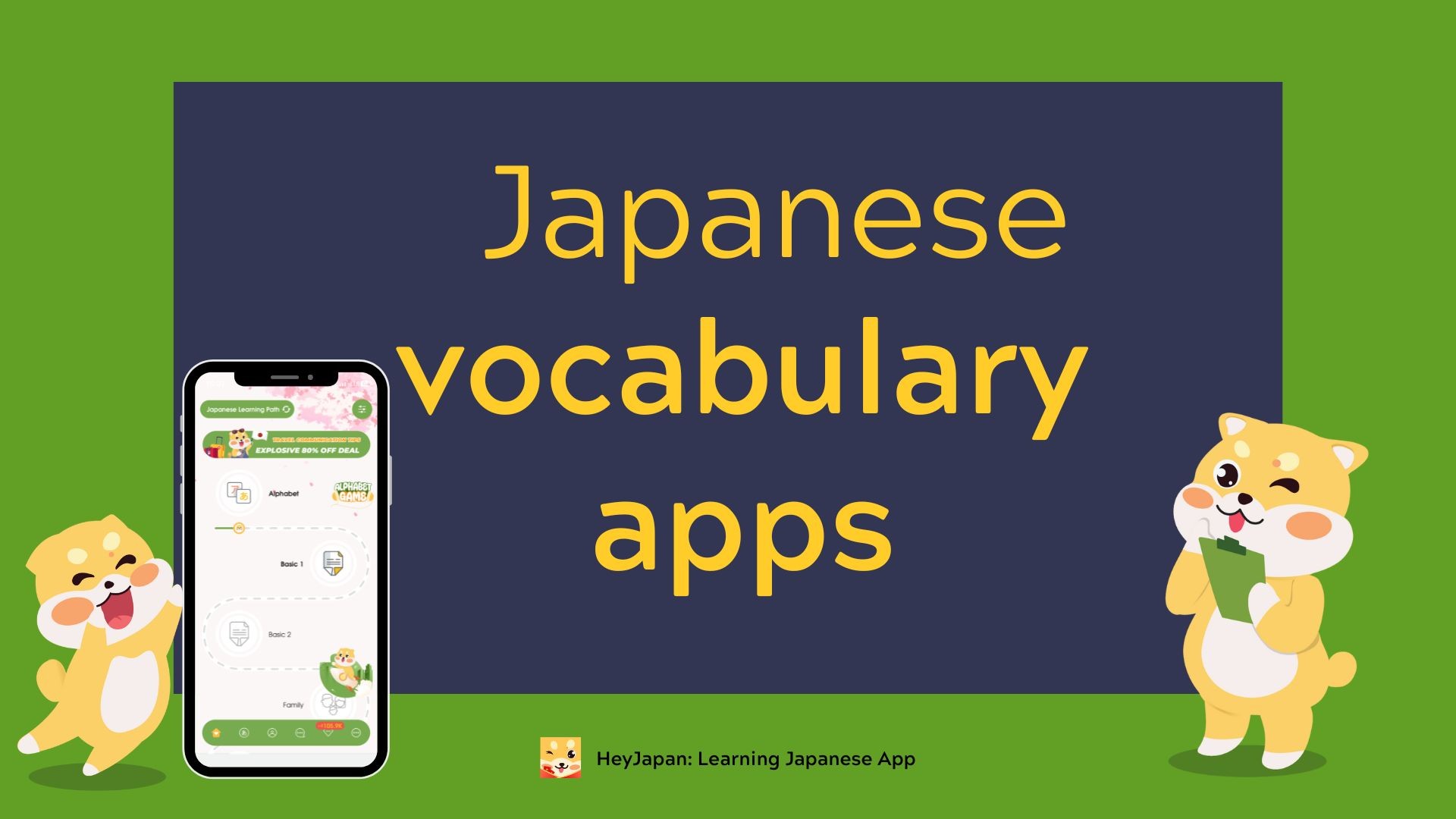Medicine Vocabulary in Japanese – Words to use in hospital and pharmacy

Quick view
Learning medicine vocabulary in Japanese is crucial for anyone traveling to Japan, or working in a medical setting. In this guide, we’ll include sections with real-life examples, some hospital 病院 (びょういん, byōin) in Japanese terms to help you during hospital visits and explain some key medical terms to better understand the medical environment.
Name of some medications
When you go to a pharmacy in Japan, knowing the names of common medications will help you get the right treatment:
| English | Japanese (Kanji) | Romaji |
| Painkiller | 鎮痛剤 | ちんつうざい (Chintsūzai) |
| Cold Medicine | 風邪薬 | かぜぐすり (Kazegusuri) |
| Cough Syrup | 咳止めシロップ | せきどめしろっぷ (Sekidome shiroppu) |
| Antihistamine | 抗ヒスタミン薬 | こうひすたみんやく (Kō hisutamin yaku) |
| Antibiotic | Antibiotic | こうせいぶっしつ (Kōseibussitsu) |
Example Sentences:
- 風邪薬を買いたいです。 (Kazegusuri o kaitai desu.)
→ I would like to buy some cold medicine.
- 咳止めシロップはありますか? (Sekidome shiroppu wa arimasu ka?)
→ Do you have cough syrup?
Body Parts – 体の部位 (からだのぶい, Karada no bui)
Knowing the names of body parts is essential when describing symptoms or visiting a Japanese doctor. Below are some common terms:
| English | Japanese (Kanji) | Romaji |
| Head | 頭 | あたま (Atama) |
| Eyes | 目 | め (Me) |
| Ear | 耳 | みみ (Mimi) |
| Mouth | 口 | くち (Kuchi) |
| Nose | 鼻 | はな (Hana) |
| Stomach | 胃 | い (I) |
| Heart | 心臓 | しんぞう (Shinzō) |
| Arm | 腕 | うで (Ude) |
| Leg | 足 | あし (Ashi) |
Example Sentences:
- 頭が痛いです。 (Atama ga itai desu.)
→ My head hurts.
- 耳が痛いです。 (Mimi ga itai desu.)
→ My ear hurts.
Medical Devices – 医療機器 (いりょうきき, Iryō kiki)
When you visit a hospital in Japan or see a Japanese doctor, you may encounter different medical devices. Here are some essential terms to know:
| English | Japanese (Kanji) | Romaji |
| Stethoscope | 聴診器 | ちょうしんき (Chōshinki) |
| Thermometer | 体温計 | たいおんけい (Taionkei) |
| Syringe | 注射器 | ちゅうしゃき (Chūshaki) |
| Bandage | 包帯 | ほうたい (Hōtai) |
| X-ray | レントゲン | れんとげん (Rentogen) |
Example Sentences:
- 聴診器で心臓の音を聞きます。 (Chōshinki de shinzō no oto o kikimasu.)
→ The doctor listens to the heart with a stethoscope.
- 体温計で熱を測ります。 (Taionkei de netsu o hakarimasu.)
→ I will measure your temperature with the thermometer.
Name of Diseases – 病気の名前 (びょうきのなまえ, Byōki no namae)
Understanding the names of common diseases is essential for communicating symptoms and receiving medical treatment in Japan. Whether you're visiting a Japanese doctor or filling out medical forms at a hospital in Japan, here are some key terms:

Example Sentences:
- 風邪を引いたので、薬をもらいたいです。 (Kaze o hiita node, kusuri o moraitai desu.)
→ I caught a cold, so I would like to get some medicine.
- 頭痛がひどくて、薬が必要です。 (Zutsū ga hidokute, kusuri ga hitsuyō desu.)
→ I have a bad headache, and I need medicine.
Conditions/ Symptoms– 症状 (しょうじょう, Shōjō)
Knowing medical conditions will help you describe your symptoms clearly when visiting a Japanese doctor or explaining your health issues at a hospital in Japan:
| English | Japanese (Kanji) | Romaji |
| Headache | 頭痛 | ずつう (Zutsū) |
| Toothache | 歯痛 | はいたみ (Haitami) |
| Stomachache | 腹痛 | ふくつう (Fukutsū) |
| Back pain | 背中の痛み | せなかのいたみ (Senaka no itami) |
| Earache | 耳の痛み | みみのいたみ (Mimi no itami) |
| Cough | 咳 | せき (Seki) |
| Fever | 熱 | ねつ (Netsu) |
| Nausea | 吐き気 | はきけ (Hakike) |
| Sore Throat | 喉の痛み | のどのいたみ (Nodo no itami) |
| Dizziness | めまい | めまい (Memai) |
| Diarrhea | 下痢 | げり (Geri) |
| Constipation | 便秘 | べんぴ (Benpi) |
| Skin Rash | 発疹 | はっしん (Hasshin) |
| Swelling | 腫れ | はれ (Hare) |
Example Sentences:
- 吐き気がします。 (Hakike ga shimasu.)
→ I feel nauseous.
- 咳が止まりません。 (Seki ga tomarimasen.)
→ I can’t stop coughing.
Mastering medicine vocabulary in Japanese is essential for navigating healthcare settings in Japan. Whether you're visiting a Japanese doctor, buying medicine at a pharmacy in Japan, or discussing medical conditions, understanding these key terms will help you communicate effectively.
🔗 Learn More:
Related post

Best Japanese Vocabulary Apps to Boost Your Language Skills







